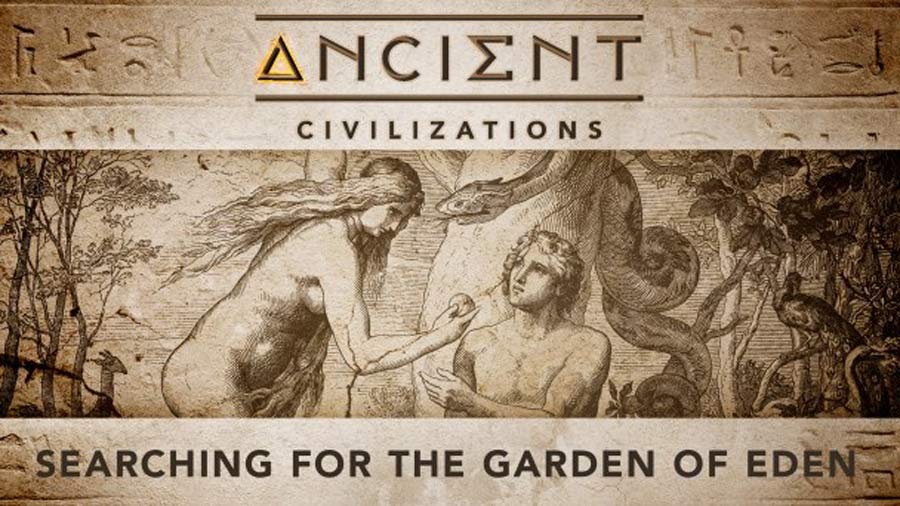Ancient Civilizations – Searching for the Garden of Eden: In this inaugural episode of Ancient Civilizations, we explore the Garden of Eden with several scholars who have peered past the accepted tales to reveal a forgotten history of the birth of humanity.
Since times immemorial, humankind has searched for the answers to who we are, where we came from and why are we here. Embedded into ancient mythology and our forgotten history, is a code which unlocks our connection with transcendence and paves the way for a new golden age.
Ancient Civilizations – Searching for the Garden of Eden
In Abrahamic religions, the Garden of Eden, also called the Terrestrial Paradise, is the biblical paradise described in Genesis 2-3 and Ezekiel 28 and 31. The location of Eden is described in the Book of Genesis as the source of four tributaries. Among scholars who consider it to have been real, there have been various suggestions for its location: at the head of the Persian Gulf, in southern Mesopotamia (now Iraq) where the Tigris and Euphrates rivers run into the sea; and in Armenia.
Like the Genesis flood narrative, the Genesis creation narrative and the account of the Tower of Babel, the story of Eden echoes the Mesopotamian myth of a king, as a primordial man, who is placed in a divine garden to guard the tree of life. The Hebrew Bible depicts Adam and Eve as walking around the Garden of Eden naked due to their sinlessness. Mentions of Eden are also made in the Bible elsewhere in Genesis, in Isaiah 51:3, Ezekiel 36:35, and Joel 2:3; Zechariah 14 and Ezekiel 47 use paradisiacal imagery without naming Eden.
The name derives from the Akkadian edinnu, from a Sumerian word edin meaning “plain” or “steppe”, closely related to an Aramaic root word meaning “fruitful, well-watered”. Another interpretation associates the name with a Hebrew word for “pleasure”; thus the Vulgate reads “paradisum voluptatis” in Genesis 2:8, and the Douay–Rheims Bible, following, has the wording “And the Lord God had planted a paradise of pleasure”
Sumer
Sumer is the earliest known civilization in the historical region of southern Mesopotamia (south-central Iraq), emerging during the Chalcolithic and early Bronze Ages between the sixth and fifth millennium BC. It is also one of the first civilizations in the world, along with ancient Egypt, Elam, the Caral-Supe civilization, the Indus Valley civilization, the Minoan civilization, and ancient China. Living along the valleys of the Tigris and Euphrates, Sumerian farmers grew an abundance of grain and other crops, the surplus from which enabled them to form urban settlements. Proto-writing dates back before 3000 BC. The earliest texts come from the cities of Uruk and Jemdet Nasr, and date to between c. 3500 and c. 3000 BC.
Most historians have suggested that Sumer was first permanently settled between c. 5500 and 4000 BC by a West Asian people who spoke the Sumerian language (pointing to the names of cities, rivers, basic occupations, etc., as evidence), a non-Semitic and non-Indo-European agglutinative language isolate. In contrast to its Semitic neighbours, it was not an inflected language.
Others have suggested that the Sumerians were a North African people who migrated from the Green Sahara into the Middle East and were responsible for the spread of farming in the Middle East. However, with evidence strongly suggesting the first farmers originated from the Fertile Crescent, this suggestion is often discarded. Although not specifically discussing Sumerians, Lazaridis et al. 2016 have suggested a partial North African origin for some pre-Semitic cultures of the Middle East, particularly Natufians, after testing the genomes of Natufian and Pre-Pottery Neolithic culture-bearers.
Alternatively, a recent (2013) genetic analysis of four ancient Mesopotamian skeletal DNA samples suggests an association of the Sumerians with Indus Valley Civilization, possibly as a result of ancient Indus-Mesopotamia relations. According to some data, the Sumerians are associated with the Hurrians and Urartians, and the Caucasus is considered their homeland.




